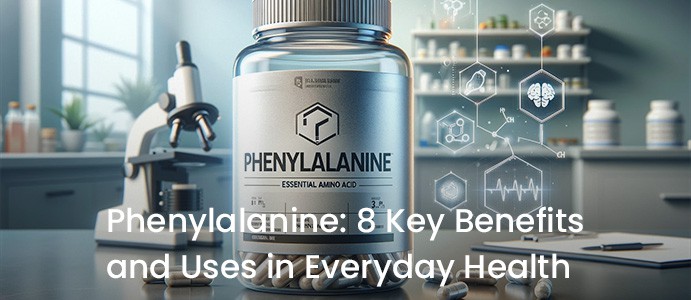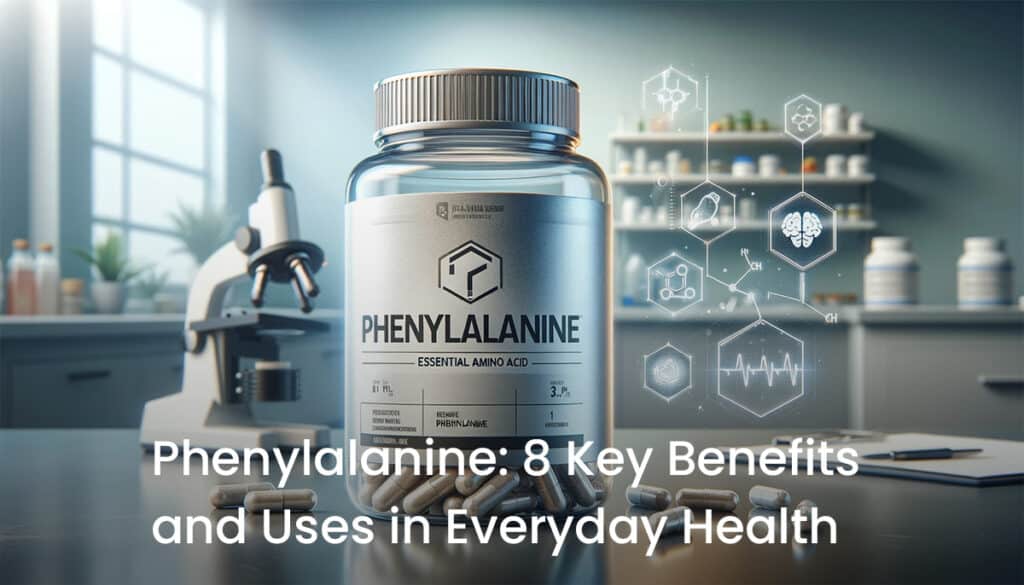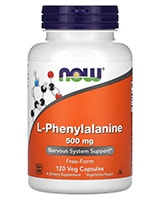

Introduction
Phenylalanine is an essential amino acid, a vital building block for proteins in the human body. Unlike non-essential amino acids, it cannot be synthesized internally and must be obtained from dietary sources.
As a crucial component for various biological processes, Phenylalanine plays a significant role in the synthesis of other amino acids and neurotransmitters, influencing both mental and physical health.
Key Benefit 1: Enhances Cognitive Function
Phenylalanine is directly involved in the production of dopamine, a neurotransmitter essential for cognitive processes such as memory, attention, and problem-solving. By serving as a precursor to dopamine, Phenylalanine helps maintain healthy brain function.
Through its influence on dopamine levels, Phenylalanine can enhance cognitive abilities[1]Romani, C., Palermo, L., MacDonald, A., Limback, E., Hall, S. K., & Geberhiwot, T. (2017). The impact of phenylalanine levels on cognitive outcomes in adults with phenylketonuria: Effects across tasks and developmental stages. Neuropsychology, 31(2), 242–254. https://doi.org/10.1037/neu0000336. This includes improved concentration, better memory retention, and a heightened capacity for learning new information.
Key Benefit 2: Mood Regulation and Antidepressant Effects
Phenylalanine is a precursor for serotonin, a neurotransmitter pivotal in mood regulation. Adequate levels of Phenylalanine can lead to balanced serotonin production, which plays a crucial role in maintaining a stable mood and potentially reducing the symptoms of depression.
Several studies have highlighted Phenylalanine’s potential as a natural antidepressant[2]Roiser, J. P., McLean, A., Ogilvie, A. D., Blackwell, A. D., Bamber, D. J., Goodyer, I., Jones, P. B., & Sahakian, B. J. (2005). The subjective and cognitive effects of acute phenylalanine and tyrosine depletion in patients recovered from depression. Neuropsychopharmacology, 30(4), 775–785. https://doi.org/10.1038/sj.npp.1300659. Its role in neurotransmitter synthesis can be particularly beneficial in managing mood disorders, including depression, by positively influencing brain chemistry.
Key Benefit 3: Pain Relief
D-phenylalanine, one of the forms of this amino acid, has been studied for its pain-relieving properties. It works by inhibiting certain enzymes involved in pain pathways, which can lead to a natural alleviation of chronic pain symptoms.
Research and anecdotal evidence suggest that D-phenylalanine can be effective in managing various types of pain, including arthritis and neuralgia[3]Walsh, N. E., Ramamurthy, S., Schoenfeld, L., & Hoffman, J. (1986). Analgesic effectiveness of D-phenylalanine in chronic pain patients. Archives of Physical Medicine and Rehabilitation, 67(7), 436–439. https://pubmed.ncbi.nlm.nih.gov/3524509/. This makes it a valuable component in natural pain management strategies.
Key Benefit 4: Supports Skin Health
Phenylalanine has shown promising results in the treatment of Vitiligo[4]Dutta, R. R., Kumar, T., & Ingole, N. (2022). Diet and Vitiligo: The Story So Far. Cureus, 14(8), e28516. https://doi.org/10.7759/cureus.28516, a condition characterized by the loss of skin pigment. Its role in melanin production can help improve skin pigmentation and overall appearance in individuals with this condition.
As a precursor in the biosynthesis of melanin, Phenylalanine is crucial for maintaining the natural colour of skin, hair, and eyes. Its adequate intake ensures proper melanin levels, contributing to skin health and protection against UV radiation.
Key Benefit 5: Helps in Managing ADHD Symptoms
The role of Phenylalanine in increasing dopamine production is particularly beneficial for individuals with Attention Deficit Hyperactivity Disorder (ADHD)[5]Volkow, N. D., Wang, G.-J., Kollins, S. H., Wigal, T. L., Newcorn, J. H., Telang, F., Fowler, J. S., Zhu, W., Logan, J., Ma, Y., Pradhan, K., Wong, C., & Swanson, J. M. (2009). Evaluating dopamine reward pathway in ADHD: clinical implications. JAMA, 302(10), 1084-1091. Retrieved from https://www.ncbi.nlm.nih.gov/pmc/articles/PMC2958516/. Enhanced dopamine levels can lead to improved attention, focus, and impulse control, which are often challenges for those with ADHD.
Phenylalanine can work synergistically with conventional ADHD medications, potentially enhancing their effectiveness. By boosting neurotransmitter levels, it can also help reduce the side effects of these medications, offering a more balanced approach to ADHD treatment.
Key Benefit 6: Aids in Parkinson’s Disease Treatment
Phenylalanine’s role in the synthesis of various neurotransmitters, including dopamine, is crucial for individuals with Parkinson’s disease. Dopamine’s decline is a key factor in Parkinson’s, and supplementing with Phenylalanine may aid in replenishing this vital neurotransmitter.
While not a standalone treatment, Phenylalanine can complement existing Parkinson’s disease therapies[6]Van Woert, M. H. (1971). Phenylalanine and tyrosine metabolism in Parkinson’s disease treated with levodopa. Clinical Pharmacology and Therapeutics, 12(2), 368-375. Retrieved from https://pubmed.ncbi.nlm.nih.gov/5577485/. By potentially enhancing dopamine levels, it may help alleviate some symptoms and improve the quality of life for those affected.
Key Benefit 7: Supports Cardiovascular Health
Phenylalanine is essential for the production of norepinephrine and epinephrine, two hormones critical for cardiovascular function[7]Gordan, R., Gwathmey, J. K., & Xie, L. H. (2014). Autonomic and endocrine control of cardiovascular function. Comprehensive Physiology, 4(1), 1-58. Retrieved from https://www.ncbi.nlm.nih.gov/pmc/articles/PMC4404375/. These hormones play a role in maintaining heart rate and blood pressure, contributing to overall cardiovascular health.
By influencing the production of stress-related hormones, Phenylalanine can have a positive impact on heart health. Proper management of stress is key in preventing heart-related issues, making Phenylalanine a valuable component in a heart-healthy diet.
Key Benefit 8: Assists in Weight Management
Phenylalanine plays a role in regulating appetite and metabolism, which can be beneficial for weight management[8]Ueda, K., Sanbongi, C., Yamaguchi, M., Ikegami, S., Hamaoka, T., & Fujita, S. (2017). The effects of phenylalanine on exercise-induced fat oxidation: a preliminary, double-blind, placebo-controlled, crossover trial. Journal of the International Society of Sports Nutrition, 14(1), 18. Retrieved from https://www.ncbi.nlm.nih.gov/pmc/articles/PMC5596463/. By influencing the release of cholecystokinin, it helps promote feelings of satiety, reducing the likelihood of overeating.
Due to its effects on appetite control and metabolic rate, Phenylalanine can be an effective aid in weight loss programs. It supports a balanced approach to weight management, making it easier to maintain a healthy body weight.
Dietary Sources of Phenylalanine
Phenylalanine is found in a variety of protein-rich foods, including meat, fish, eggs, dairy products, soy products, nuts, and seeds. Vegetarians and vegans can obtain it from plant-based sources like beans, lentils, and whole grains.
The recommended daily intake of Phenylalanine varies depending on age, sex, and health status. It’s important to consume it as part of a balanced diet to ensure adequate levels for optimal health.
Precautions and Side Effects
Individuals with Phenylketonuria (PKU), a genetic disorder, must avoid excessive intake of Phenylalanine as their bodies cannot metabolize it properly. This can lead to serious health complications, including cognitive impairment.
While generally safe for most people, excessive intake of Phenylalanine can lead to side effects like nausea, heartburn, and headaches. It’s important to consult a healthcare professional before starting any supplement regimen, especially for individuals with existing health conditions.
Conclusion
Phenylalanine is an essential amino acid with a spectrum of benefits, from enhancing cognitive function and mood regulation to aiding in pain relief, skin health, ADHD management, Parkinson’s disease treatment, cardiovascular health, and weight management.
A balanced diet including Phenylalanine-rich foods is key to reaping these health benefits. While supplements are available, natural sources are often the best way to meet your daily requirements, ensuring you get the full range of benefits this essential amino acid offers.
Buy Phenylalanine Online Review Comparison Table
 L-Phenylalanine | iHerb | 120 pills (500 mg) | $12.23 |  Worldwide, AU | Visit Website >> |
References
| ↑1 | Romani, C., Palermo, L., MacDonald, A., Limback, E., Hall, S. K., & Geberhiwot, T. (2017). The impact of phenylalanine levels on cognitive outcomes in adults with phenylketonuria: Effects across tasks and developmental stages. Neuropsychology, 31(2), 242–254. https://doi.org/10.1037/neu0000336 |
|---|---|
| ↑2 | Roiser, J. P., McLean, A., Ogilvie, A. D., Blackwell, A. D., Bamber, D. J., Goodyer, I., Jones, P. B., & Sahakian, B. J. (2005). The subjective and cognitive effects of acute phenylalanine and tyrosine depletion in patients recovered from depression. Neuropsychopharmacology, 30(4), 775–785. https://doi.org/10.1038/sj.npp.1300659 |
| ↑3 | Walsh, N. E., Ramamurthy, S., Schoenfeld, L., & Hoffman, J. (1986). Analgesic effectiveness of D-phenylalanine in chronic pain patients. Archives of Physical Medicine and Rehabilitation, 67(7), 436–439. https://pubmed.ncbi.nlm.nih.gov/3524509/ |
| ↑4 | Dutta, R. R., Kumar, T., & Ingole, N. (2022). Diet and Vitiligo: The Story So Far. Cureus, 14(8), e28516. https://doi.org/10.7759/cureus.28516 |
| ↑5 | Volkow, N. D., Wang, G.-J., Kollins, S. H., Wigal, T. L., Newcorn, J. H., Telang, F., Fowler, J. S., Zhu, W., Logan, J., Ma, Y., Pradhan, K., Wong, C., & Swanson, J. M. (2009). Evaluating dopamine reward pathway in ADHD: clinical implications. JAMA, 302(10), 1084-1091. Retrieved from https://www.ncbi.nlm.nih.gov/pmc/articles/PMC2958516/ |
| ↑6 | Van Woert, M. H. (1971). Phenylalanine and tyrosine metabolism in Parkinson’s disease treated with levodopa. Clinical Pharmacology and Therapeutics, 12(2), 368-375. Retrieved from https://pubmed.ncbi.nlm.nih.gov/5577485/ |
| ↑7 | Gordan, R., Gwathmey, J. K., & Xie, L. H. (2014). Autonomic and endocrine control of cardiovascular function. Comprehensive Physiology, 4(1), 1-58. Retrieved from https://www.ncbi.nlm.nih.gov/pmc/articles/PMC4404375/ |
| ↑8 | Ueda, K., Sanbongi, C., Yamaguchi, M., Ikegami, S., Hamaoka, T., & Fujita, S. (2017). The effects of phenylalanine on exercise-induced fat oxidation: a preliminary, double-blind, placebo-controlled, crossover trial. Journal of the International Society of Sports Nutrition, 14(1), 18. Retrieved from https://www.ncbi.nlm.nih.gov/pmc/articles/PMC5596463/ |

Leave a Reply